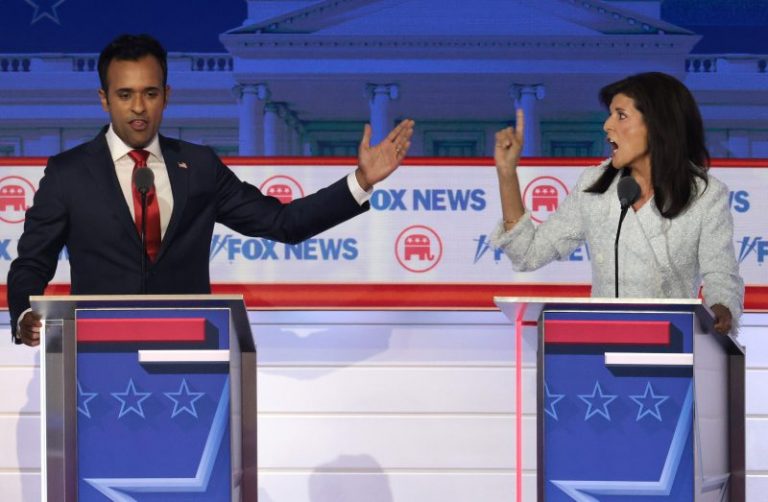A Washington Post analysis put numbers behind a pattern that would have been apparent to anyone watching Wednesday night’s first debate of the 2024 Republican presidential nominating contest. It was, in fact, Vivek Ramaswamy who drew the most attacks from the other candidates on the stage.
In part, this was because he tacitly encouraged them to do so. His approach to his campaign from the outset has been to differentiate himself by championing the aggressive, confrontational rhetoric of the right-wing fringe, a tendency that contributes to criticisms that he’s merely parroting the front-runner, Donald Trump. It’s often actually the case that both candidates are saying the stuff the fringe-right is saying rather than Ramaswamy following Trump’s lead.
But in part the attacks on Ramaswamy had a more tactical intent. He’s not leading in polling by any stretch; that, again, is Trump. He’s not even in second place, a position held by Florida Gov. Ron DeSantis. But he is in third place and rising — while DeSantis’s position is slipping.
Instead of beating the dead horse, one might think, it’s better to throw obstacles in front of the one who’s gaining.
This surge by Ramaswamy is relatively recent, but it’s real. Over the course of the year, FiveThirtyEight’s polling average shows the contest going from a two-man, Trump-DeSantis contest — with Ramaswamy undeclared and absent from polling — to a robust Trump lead and a two-man race for second.
A month ago, FiveThirtyEight had Trump at 50 percent, DeSantis at 24 and Ramaswamy at 3. Now, Trump’s at 52 percent, DeSantis at 15 and Ramaswamy at 10. Ramaswamy has closed 16 points of the 21-point gap that existed on July 24.
Yahoo News polling conducted by YouGov shows where those shifts have occurred. At the beginning of the year, DeSantis was the preferred candidate of more moderate likely Republican primary voters, including independents who vote Republican. Now, Ramaswamy leads with that group. DeSantis was also running closely with Trump among likely primary voters with a college degree. His support with that group has collapsed.
This doesn’t mean that Ramaswamy is on a trajectory to overtake Trump, certainly. It does mean, though, that he’s doing the one thing that every person on that debate stage wants to do: He’s gaining ground.
It’s not clear how DeSantis’s trajectory in the opposite direction can be halted. His strength earlier this year was predicated to a large extent on his being seen as the guy who could surpass Trump in primary voting if the anti-Trump vote coalesced around him. That strategy depended to some extent on his continuing to present a real challenge to Trump, spurring other candidates not to enter the race or spurring donors and endorsers to rally around him. But that didn’t happen immediately and, once his campaign announcement failed to trigger a flurry of enthusiasm, there was a disincentive for it to happen at all. No one wants to go all in on the guy who’s collapsing — especially if the only reason you’re supporting the guy is because he was supposedly the sole threat to Trump.
What the people on the stage were battling for was less the party’s nomination than to be the preferred alternative to Trump. It seems increasingly obvious that this will not be DeSantis. Meanwhile, Ramaswamy is making moves. So that’s where you target your energy.
That his approach to the debate was to be intentionally obnoxious to his opponents simply made that targeting easier to implement.

